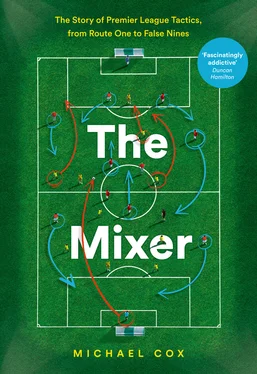After just six years of the Premier League, however, Arsenal had become the model for futuristic football. They were the division’s most attractive side, the most forward-thinking club in terms of physiology, they recruited footballers from untapped markets across Europe and were the first team in English top-flight history to win the league with a foreign manager. The revolution, however, was not solely about Arsène Wenger.
Arsenal had enjoyed tremendous success in their eight seasons under George Graham, who won six major honours, including two league titles and the European Cup Winners’ Cup. When Graham was suddenly sacked midway through 1994/95 after accepting an illegal payment from an agent, Arsenal vice-chairman David Dein wanted to appoint former Monaco manager Wenger, who he’d encountered by chance at Highbury six years earlier. Dein realised the need for revolution; whereas most directors of English clubs surrounded themselves with like-minded figures and lived in a rather small world, Dein also had a prominent role at the Football Association, which meant he was frequently travelling abroad, moving in international circles and discovering how antiquated English football had become. The move didn’t happen this time. Wenger went to Japan – at this stage a complete footballing backwater, having never qualified for the World Cup – to coach Nagoya Grampus Eight. Japan had recently launched an extraordinary 100-year football plan with the intention of winning the World Cup by 2092, the type of long-term thinking Wenger would become closely associated with.
Instead, Arsenal appointed Bruce Rioch. He was a considerably safer choice, and somewhat reminiscent of Graham, both being ex-Scottish international midfielders and strict disciplinarians. Rioch’s reign was troubled, as he ostracised senior players, but during his sole season in charge, 1995/96, he recorded a respectable fifth-place finish – and more crucially set the wheels in motion for the Wenger revolution, introducing a passing game that was distinctly different from the direct style Graham had favoured towards the end of his reign. He had two major objectives: encouraging Arsenal to play out from the back and ensuring there was less dependence upon Ian Wright in terms of goalscoring. ‘Bruce encouraged us to pass the ball through midfield more,’ goalkeeper David Seaman said. ‘Had he stayed longer, I am sure he would have gradually changed the whole way we played – as was to happen later with Arsène Wenger.’
England captain David Platt, who arrived at Arsenal shortly after Bergkamp, had been playing in Serie A under revered coaches like Giovanni Trapattoni and Sven-Göran Eriksson, yet said that Rioch ‘deeply impressed me with his vision of how the game should be played’. Martin Keown underlined the difference between Graham and Rioch: ‘Under George the emphasis was to win the ball back, press as a team, deny the opposition space and have lots of offsides … Bruce began by introducing the passing game. We would work on keeping the ball, whereas with George we worked on winning it back.’ Rioch was a huge admirer of flair players, and the board provided him with the transformative footballer Arsenal desperately needed: Dennis Bergkamp.
In terms of stylistic impact upon the Premier League, Bergkamp is second only to Eric Cantona. They could, in slightly different circumstances, have ended up at one another’s clubs; Alex Ferguson had explored the possibility of recruiting Bergkamp before eventually signing Cantona, who, upon leaving Leeds, supposedly wanted to join one of Manchester United, Liverpool or Arsenal. When Cantona finished third in the 1993 Ballon d’Or, he made a particular point of paying tribute to Ajax’s Bergkamp, who had finished second behind Roberto Baggio. He recognised a kindred spirit.
When Bergkamp left Ajax for Inter Milan that year, he was signed specifically because Inter were desperate to evolve from a defensive, unattractive side to a more aesthetically pleasing outfit. They were tired of the plaudits showered upon city rivals AC Milan, who had become Europe’s most celebrated side courtesy of Arrigo Sacchi’s revolutionary coaching and the efforts of three brilliant Dutchmen: Marco van Basten, Frank Rijkaard and Ruud Gullit. Inter had challenged them with a team featuring three Germans: Jürgen Klinsmann, Andreas Brehme and Lothar Matthäus. But at this stage there was a huge difference in the perceptions of Dutch footballers (intelligent, creative, dynamic) and German footballers (efficient, ruthless, boring) and Inter attempted to becoming more stylish by signing two Dutchmen of their own, Bergkamp and his Ajax teammate Wim Jonk.
But Inter’s revolution never occurred. After poor initial results, they became more defensive and sacked their manager, leaving Bergkamp playing in a more direct side and unable to link attacking moves. He managed just 11 goals in two Serie A campaigns combined. It’s fascinating, therefore, that Bergkamp put that frustrating experience aside and made a second transfer to a club who required a catalyst for technical football. After retirement, Bergkamp outlined his determination to be a revolutionary: ‘Like when I chose Inter instead of Milan or Barcelona, I thought: “I’m the sort of player you don’t see at Arsenal, so maybe I can show people this is my way of playing.”’
Arsenal, who had generally been reluctant to pay large fees and therefore missed out on top talent during the Premier League’s first three seasons, broke their club record fee three times over to sign Bergkamp and immediately reallocated Paul Merson’s number 10 shirt to their new technical leader. The Independent ’s headline read, ‘Rioch signs Bergkamp to signal new era’. That would prove particularly prescient, but there were sceptics – England left-back Stuart Pearce said it was a ‘massive gamble’, pundits questioned his value when he took seven games to score, while Tottenham chairman Alan Sugar said his arrival amounted to ‘cosmetic surgery’. Instead, it was more like a brain transplant. ‘He was the one that changed our whole attitude towards training,’ said Ray Parlour. ‘Just watching the way he handled himself from day one was an eye-opener. It made you think: hold on a second, I need to up my effort here.’
Rioch, in particular, offered tremendous support, defending him staunchly from the early criticism and encouraging Bergkamp’s teammates to supply him frequently between the lines, although Arsenal were sometimes crowded in that zone, with Bergkamp, David Platt and Paul Merson broadly playing similar roles. It was a notable shift, however, from Arsenal’s previous approach of incessantly knocking long balls over the top for Wright. Bergkamp’s first campaign was patchy – and he endured more quiet seasons at Highbury than his reputation might suggest – but he was unquestionably Arsenal’s game-changer, someone who brought the best out of others. Bergkamp had finished as Eredivisie top goalscorer three times, but said his role changed upon arriving in the Premier League, becoming an assister more than a goalscorer, as shown by the fact that he collected 93 Premier League assists compared with 87 goals. Tellingly, the only other players to have scored 50+ Premier League goals but been more prolific assisters are all midfielders: Ryan Giggs, David Beckham, Damien Duff, Gareth Barry and Danny Murphy.
There were many similarities to Cantona; Bergkamp was also a perfectionist who worked upon his game tirelessly after training, practising seemingly simple passes repeatedly, setting the standard in terms of technique and professionalism. Supporters instantly recognised his ability, but teammates raved about the things you can’t fully appreciate from the stands: the weight of his passes, the spin on the ball. Similar to Cantona, his pace was often overlooked – before the 2003/04 season, when Bergkamp was 33, he recorded the third-fastest 60m sprint time at Arsenal, behind Thierry Henry and Jermaine Pennant, but ahead of Ashley Cole, Robert Pirès, Gaël Clichy and Sylvain Wiltord. And as with both Cantona and Zola, opponents often remarked upon his surprising strength for a primarily creative player, enabling him to compete with aggressive centre-backs. ‘People don’t think that Dennis had such strength,’ said Sol Campbell, a future teammate, ‘but believe me, he was one of the strongest I played with or against.’ Early in 1997/98, he scored a brilliant long-range strike having shoved aside Southampton left-back Francis Benali, considered the dirtiest defender in the Premier League. For all his technical quality, Bergkamp also had a petulant streak. He was dismissed four times throughout his Arsenal career, all straight red cards: an elbow, a push and two wild tackles, so ‘the Iceman’ always seemed a peculiarly inappropriate moniker. Besides, as nicknames go, considering Bergkamp’s famous refusal to board an aeroplane, ‘the Non-Flying Dutchman’ was difficult to beat.
Читать дальше












